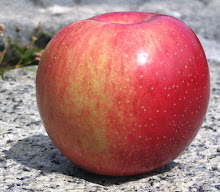Set the Wayback Machine to 1905 and put your finger on the pomological pulse of New York and the world.
The New York State Department of Agriculture has just published the latest edition of The Apples of New York, including detailed descriptions of every variety then grown in the Empire State (regardless of place of origin).
Today, this work is out of print, in the public domain, digitized, and online.
Look in vain for modern favorites, but thrill to descriptions of lost flavors of yesteryear.
Apples of New York describes a world in which hard cider is still a popular drink and apple trees grow wild in parts of the Northeast. The mighty Baldwin has yet to yield to that little-know upstart, McIntosh; the blossoms of hundreds of varieties bloom across the land.
We'll probably never have the chance to taste most of the apples described in this book.
Browse this work online (Volume I, cataloging so-called winter apples, that is, keepers); download it as a pdf or epub file. Volume II of this two-volume work is here (also pdf, no epub).
 |
Each volume has its own index to varieties listed.
The online version includes a dandy search feature.
The level of information on each variety varies, but includes such precise and systemic physical descriptions of fruit, leaf, and tree as to put my own tasting inventory to shame.
There are no descriptions of the apple blossoms, but many drawings and even color plates.
The 1905 edition was compiled by Spencer Beach.
Update:
Revised slightly to differentiate between volumes I and II.


I wonder why hard cider went out of favour. It's still very popular in the UK.
ReplyDeleteThe short answer is that hard cider in these United States did not survive Prohibition.
ReplyDeleteThere's got to be more to the story than that, though there's no denying that the temperance movement took its toll on the availability of the drink and the public's taste for it. Other suppressed beverages managed to come back when Prohibition was repealed, however.
Mass-produced domestic cider hereabouts is awfully sweet stuff. The craft ciders are better, though I've never found one that knocked my socks off the way that French cidres can. I haven't had the pleasure of cider from the UK.